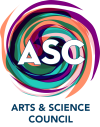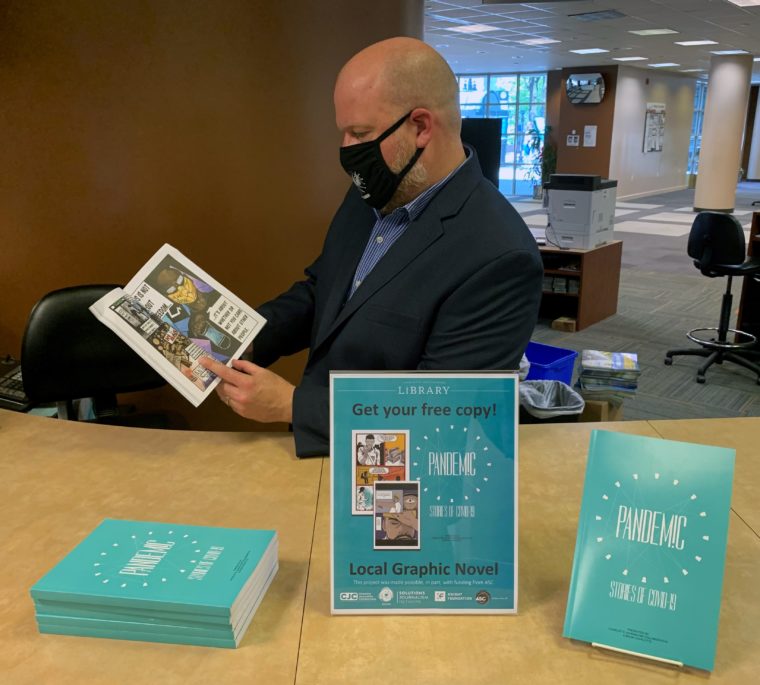Expanding Connections: Charlotte Journalism Collaborative – ASC Cultural Vision Grant Recipient
By MICHAEL J. SOLENDER
Charlotte Journalism Collaborative project blends impactful reporting with graphic artistry to take vital stories to broader audience.
When Covid-19 first began to impact our community in early 2020, the Charlotte Journalism Collaborative (CJC), a diverse group of six area media and three community partners, invested in an innovative approach to reach an audience of untypical news consumers with credible and actionable messaging.
At the time, the pandemic coincided with heightened civic activism surrounding the police shooting of George Floyd and a Black Lives Matter movement increasingly using street art, murals, and signage to carry messaging to large swaths of the population. Charlotte’s own uptown Black Live’s Matter mural captured national attention and made a powerful community statement reaching across the socio-economic strata of Charlotte.
The blocks long mural, each letter crafted by local black artists, possessed an energy and artistry, CJC wanted to harness in sharing information about Covid-19. Chris Rudisill, CDC’s director, was part of the team that thought combining art and journalism through a graphic novel would impactful – both in reach and relatability to an audience seeking trustworthy information. CJC turned to the Charlotte’s artist-led performance and visual arts non-profit, BOOM Charlotte, to help develop and produce a bilingual online (and now print) graphic novel, The Pandemic: Stories of Covid 19.
Nine installments were created by CJC and ran biweekly from October 2020 through February 2021. The series is hosted online at the CJC website and WEBTOON, a creator-based online platform for comics and graphic novels. Eight local artists (representing Charlotte Black and LGBTQ communities) were paired with CJC journalists to collaborate on each story. Snapshots include deeply personal impact stories of Covid infections, living under quarantine, practical information on transmission, protection, and accessing care.
“CJC was formed in 2019 to tell broader, deeper stories surrounding significant problems facing our communities,” said Rudisill. “The collaborative allows us to experiment a bit and be bolder with creative ideas. A 50’s style graphic novel captured the feel we looked for and allowed us to importantly maintain the news integrity at the core of the project.”
CJC’s media partners include The Charlotte Observer, La Noticia, Qcitymetro, Quotes, WCNC, and WFAE 90.7. Community partners supporting CJC include the James L. Knight School of Communication at Queens University, Charlotte Mecklenburg Library, and Free Press.
Rudisill noted a key strength of the collaborative is its reach. “One of the benefits of this collaborative is the ability to amplify stories to a broader population,” he said. “We’re able to use the experience of our collaborative work to further share information and action-based solutions around Covid. We heard from people that there is so much information out there, people didn’t always know where to look. We know there are many not turning on the news every night and believe these are important audiences to reach.”
Earlier this year, CJC received an ASC Cultural Vision Grant to support the project.
The funding allowed for CJC to complete the storytelling component of the graphic novel and launch programming elements including an artist/journalist forum on collaborating in the era of Covid-19, and Graphic Novel Workshop helping storytellers translate their stories into graphic novels. ASC grant funds also supported the development, production, and distribution of a print version of the graphic novel. CJC printed 2700 copies with the books slated for all branches of the Charlotte Mecklenburg Library, area colleges and universities, CMS middle and high schools, and to BOOM Charlotte for distribution.
“This project has been a game changer,” says Rudisill, “In terms of how we model and tell stories. It opens door for this type [artist/journalist] of collaboration going forward and is a unique opportunity to expand and connect around the ways we tell stories and reach more people.”


